运用你所掌握的数据结构,设计和实现一个 LRU (最近最少使用) 缓存机制 。实现 LRUCache 类:
LRUCache(int capacity) 以正整数作为容量 capacity 初始化 LRU 缓存
int get(int key) 如果关键字 key 存在于缓存中,则返回关键字的值,否则返回 -1 。
void put(int key, int value) 如果关键字已经存在,则变更其数据值;如果关键字不存在,则插入该组「关键字-值」。当缓存容量达到上限时,它应该在写入新数据之前删除最久未使用的数据值,从而为新的数据值留出空间。
进阶:你是否可以在 O(1) 时间复杂度内完成这两种操作?
输入["LRUCache", "put", "put", "get", "put", "get", "put", "get", "get", "get"][[2], [1, 1], [2, 2], [1], [3, 3], [2], [4, 4], [1], [3], [4]]输出[null, null, null, 1, null, -1, null, -1, 3, 4]解释LRUCache lRUCache = new LRUCache(2);lRUCache.put(1, 1); // 缓存是 {1=1}lRUCache.put(2, 2); // 缓存是 {1=1, 2=2}lRUCache.get(1); // 返回 1lRUCache.put(3, 3); // 该操作会使得关键字 2 作废,缓存是 {1=1, 3=3}lRUCache.get(2); // 返回 -1 (未找到)lRUCache.put(4, 4); // 该操作会使得关键字 1 作废,缓存是 {4=4, 3=3}lRUCache.get(1); // 返回 -1 (未找到)lRUCache.get(3); // 返回 3lRUCache.get(4); // 返回 4
提示:
- 1 <= capacity <= 3000
- 0 <= key <= 3000
- 0 <= value <= 104
- 最多调用 3 * 104 次 get 和 put
思路
说实话,一开始我被这个题目搞的云里雾里,题目都没看懂,我tm真菜,看了题解答案,发现缓存其实就是存储hash或者链表存储,实现缓存机制。
假设我们有一个玩具摊位,可以向顾客展示小玩具,但是摊位大小有限,我们不能把所有的玩具都摆在摊位上,所以我们就把大部分的玩具都放在了仓库里。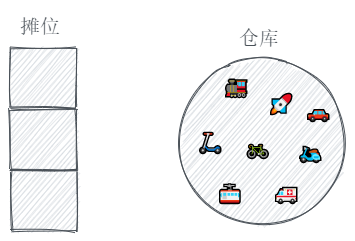
如果有顾客来问,我们就去仓库把那个玩具拿出来,摆在摊位上。
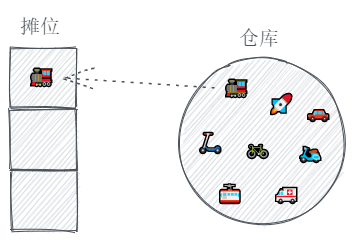
因为最上面的那个位置最显眼,所以我们想总是把最新拿出来的玩具放在那。
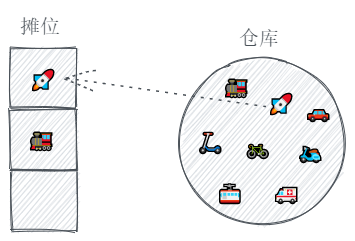
但是摊位大小有限,很快就摆满了,如果这时又来了顾客想看新玩具。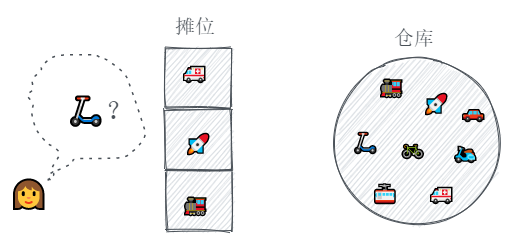
我们只能把最下面的玩具拿回仓库(因为最下面的位置相对没那么受欢迎),腾出一个位置来放新玩具。
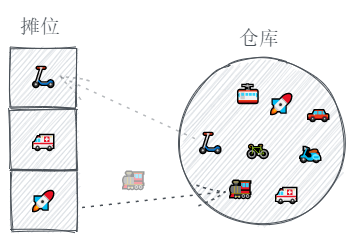
如果顾客想看的玩具就在摊位上,我们就可以直接展示这个玩具,同时把它放到最上面的位置(有人问说明它受欢迎嘛),其他的玩具就要挪挪位置了。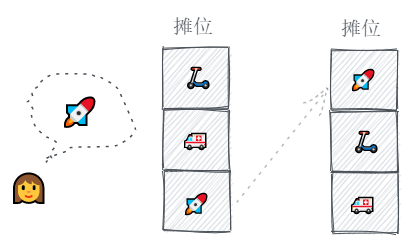
回到计算机问题上面来,我们要用什么来表示我们的玩具摊位呢,如果用数组,玩具在摊位上的位置挪来挪去的,时间复杂度得是 O(N)O(N),所以只能用链表了。
用链表的话,随意移除一个节点的时间复杂度是 O(1)O(1),移除节点后,我们还得把它前后两个节点连起来,所以用双向链表会比较方便。
但是链表获取节点的时间复杂度是 O(N)O(N),我们手动移动玩具的时候,只需要看一眼就知道要找的玩具在哪个位置上,但是计算机没有那么聪明,所以我们还需要一个数据结构(哈希表)来帮计算机记录什么玩具在什么位置上。
复杂度分析
时间复杂度:O(1)O(1)。
空间复杂度:链表 O(N)O(N),哈希表 O(N)O(N),结果还是 O(N)O(N)。
伪代码
// putif key 存在:更新节点值把节点移到链表头部else:if 缓存满了:移除最后一个节点删除它在哈希表中的映射新建一个节点在哈希表中增加映射把节点加到链表头部// getif key 存在:返回节点值把节点移到链表头部else:返回 -1
class DoubleLinkedListNode {constructor(key, value) {this.key = key;this.value = value;this.prev = null;this.next = null;}}class LRUCache {constructor(capacity) {this.capacity = capacity;// Mappings of key->node.this.hashmap = {};// Use two dummy nodes so that we don't have to deal with the head/tail seperately.this.dummyHead = new DoubleLinkedListNode(null, null);this.dummyTail = new DoubleLinkedListNode(null, null);this.dummyHead.next = this.dummyTail;this.dummyTail.prev = this.dummyHead;}_isFull() {return Object.keys(this.hashmap).length === this.capacity;}_removeNode(node) {node.prev.next = node.next;node.next.prev = node.prev;node.prev = null;node.next = null;return node;}_addToHead(node) {const head = this.dummyHead.next;node.next = head;head.prev = node;node.prev = this.dummyHead;this.dummyHead.next = node;}get(key) {if (key in this.hashmap) {const node = this.hashmap[key];this._addToHead(this._removeNode(node));return node.value;} else {return -1;}}put(key, value) {if (key in this.hashmap) {// If key exists, update the corresponding node and move it to the head.const node = this.hashmap[key];node.value = value;this._addToHead(this._removeNode(node));} else {// If it's a new key.if (this._isFull()) {// If the cache is full, remove the tail node.const node = this.dummyTail.prev;delete this.hashmap[node.key];this._removeNode(node);}// Create a new node and add it to the head.const node = new DoubleLinkedListNode(key, value);this.hashmap[key] = node;this._addToHead(node);}}}/*** Your LRUCache object will be instantiated and called as such:* var obj = new LRUCache(capacity)* var param_1 = obj.get(key)* obj.put(key,value)*/
作者:suukii
链接:https://leetcode-cn.com/problems/lru-cache/solution/146-lru-huan-cun-ji-zhi-shuang-xiang-lian-biao-ha-/
来源:力扣(LeetCode)
著作权归作者所有。商业转载请联系作者获得授权,非商业转载请注明出处。

